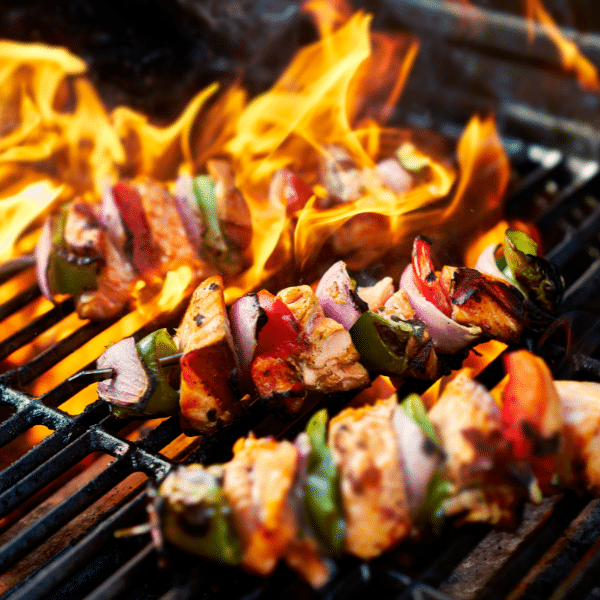Safe Grilling Tips

from www.eatright.org
![]()
Whether you fire up the grill for weekend entertaining or use it each night,
think of your grill as an extension of your kitchen. Follow the same food safety steps both inside and out.
Start Clean
Whether you are using your own grill or a public grill at a park or campground, scrub it with hot, soapy water before each use. Wash your hands before, during and after food preparation. Since bacteria can easily transfer from the body to foods and surfaces, wash your hands thoroughly after switching tasks. This is especially important after handling raw meat. Pack moist towelettes or a hand sanitizer in your cooler for when soap and water are not readily available.
Safely Thaw and Marinate Meat
Thaw frozen foods in the refrigerator or microwave, not on the countertop or by the grill. Marinate meat in the refrigerator. Never use the same brush to baste raw and cooked meat. Wash brushes in hot, soapy water between uses. Boil any leftover marinade before using it to season cooked meat.
Don’t Share Ware
Use separate cutting boards, plates and grilling utensils when handling raw meat and ready-to-eat foods. Color-code them to easily separate items used with raw foods. After using knives, grilling tongs or forks with raw meat and poultry, clean them thoroughly with hot soapy water.
Cook It Right
Grilled foods can be harmful if not fully cooked. The only reliable way to ensure meat is safe and ready to eat is by using a meat thermometer. Checking the color of meat or juices does not work. Use the following internal temperature guide:
Steak: 145°F (Allow to rest for 3 minutes before carving or consuming)
Hamburgers: 160°F
Chicken: 165°F
Watch the Clock
Don’t leave food, even if it’s fully cooked, out of refrigeration for extended periods of time. Put all dishes in the refrigerator within two hours. In hot weather (90°F or warmer), this time is reduced to one hour. Set out perishable food items in one-hour shifts. After each shift, place uneaten food back in a refrigerator set below 40°F. Lengthen the staying power of perishable foods by keeping them on ice. Keep a refrigerator thermometer on hand to make sure foods stay chilled properly in the cooler or refrigerator.
Let Leftovers Go
Store leftovers in shallow, airtight containers (two inches deep or less). Write the date on top. Leftover grilled foods have a refrigerator life of three to four days. If you don’t finish a leftover within this time frame, toss it. Reheat leftovers to an internal temperature of 165°F before serving a second time around. Check the temperature with a meat thermometer. Boil leftover sauces before reusing them on cooked meat.
